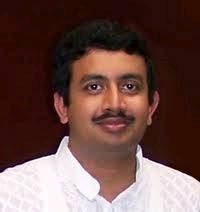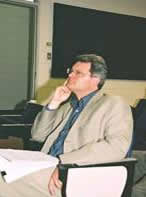|
TOWARD A SCIENCE OF CONSCIOUSNESS 2011 STOCKHOLM MAY 1-8, 2011 AULA MAGNA HALL
PLENARY 10 Friday May 6 8:30 am to 10:40 am
JACK TUSZYNSKI, Alberta, Information Processing Within Dendritic Cytoskeleton RUDOLPH E. TANZI, Harvard, "THE AMYLOID TRAP" HYPOTHESIS OF ALZHEIMER'S DISEASE
ANIRBAN BANDYOPADHYAY JACK TUSZYNSKI RUDOLPH E. TANZI Tsukuba Alberta Harvard
Anirban Bandyopadhyay completed his doctorate in supramolecular electronics at IACS, Kolkata, in 2005. He is a permanent scientist in NIMS, Tsukuba Japan. In 2008, he and his colleagues invented nano brain an artificial molecular device that mimics a fundamental hardware feature of our brain. Apart from holding executive positions in various scientific organizations and editorial board of information related journals, he is involved in setting up a global platform of creating super-intelligent machine "Bramha" Jack Tuszynski received his M.Sc. with distinction in Physics from the University of Poznan (Poland) in 1980. He received his Ph.D. in Condensed Matter Physics from the University of Calgary in 1983. He did a Post-Doctoral Fellowship at the University of Calgary Chemistry Department in 1983. He was an Assistant Professor at the Department of Physics of the Memorial University of Newfoundland from 1983 to 1988, and at the University of Alberta Physics Department from 1988 to 1990. He joined the University of Alberta Physics Department in 1993. He is on the editorial board of the Journal of Biological Physics. Rudolph E. Tanzi is the Joseph and Rose Kennedy Professor of Neurology at Harvard University, and Director of the Genetics and Aging Research Unit at Massachusetts General Hospital (MGH). Dr. Tanzi has been investigating the genetics of neurological disease since 1980 when he participated in the study that led the first disease gene to be found by genetic analysis (Huntington's disease). In 1987, Dr. Tanzi isolated the first familial Alzheimer's disease (FAD) gene, known as the amyloid ß-protein (A4) precursor. In 1995, he co-discovered the second two FAD genes: presenilin 1 and 2. Dr. Tanzi is currently carrying out genome wide screens to identify additional AD genes. His research the role of zinc and copper in neurodegeneration has led to successful clinical trials for AD. Dr. Tanzi has received many awards, including the two highest awards for Alzheimer's disease research: The Metropolitan Life Award and Potamkin Prize. In 2007, he was included on the list of the "Harvard 100: Most Influential Alumni". Dr. Tanzi has co-authored over 400 research articles, including three of the top ten most cited AD papers. He also co-authored the popular trade book “Decoding Darkness: The Search for the Genetic Causes of Alzheimer’s Disease”. |
|
|||||||||||||



